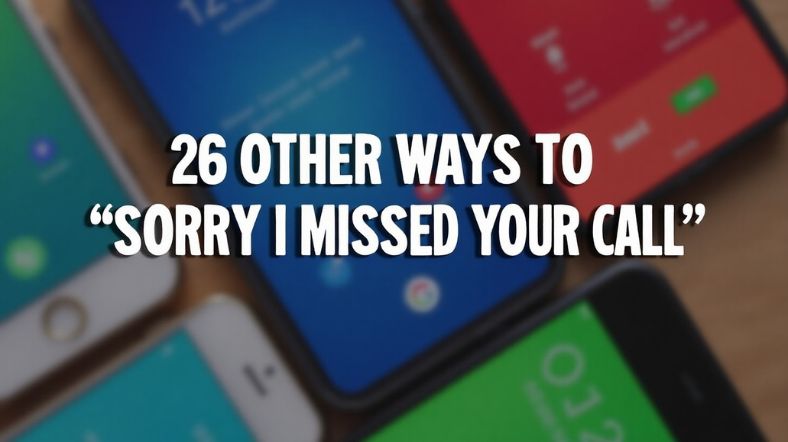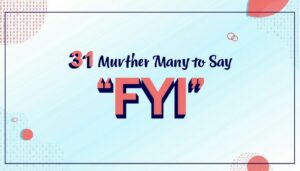It’s an inevitable part of modern life: missing a call. Whether it’s a friend, family member, colleague, or client, you want to acknowledge the missed call in a way that feels sincere and respectful.
This article offers 26 alternative ways to say “Sorry I missed your call,” with a variety of tones for both professional and casual contexts.
These alternatives will help you express yourself in a thoughtful, positive way that fits your communication style.
My Apologies for Not Answering
This phrase is a polite, neutral way to acknowledge that you weren’t able to pick up the phone. It works in both formal and informal situations.
Example:
- “My apologies for not answering earlier. I was in a meeting, but I’m available now.”
- Context: Ideal for emails, messages, or voicemails when you want to maintain professionalism.
Missed Your Call Let’s Connect
This alternative is friendly and inviting, perfect for situations where you want to quickly reschedule or restart the conversation.
Example:
- “Missed your call—let’s connect when you have a moment!”
- Context: Great for casual messages to friends or colleagues.
Sorry for the Delay
If you’ve missed a call for a while, this phrase shows that you understand the delay and are ready to make up for it.
Example:
- “Sorry for the delay in getting back to you, but I’m here now!”
- Context: A suitable phrase for business or personal interactions, particularly when the missed call has been pending for some time.
I Couldn’t Pick Up
A simple explanation that acknowledges you couldn’t take the call. It’s casual and to the point.
Example:
- “Hey, I couldn’t pick up earlier. I was tied up, but now I’m free!”
- Context: Best used for quick texts or voicemails when you want to sound informal and approachable.
Just Saw Your Call
This phrase works well when you’ve just noticed the missed call and are eager to reconnect right away.
Example:
- “Just saw your call! Sorry about that—how can I help?”
- Context: Ideal for casual exchanges with friends or colleagues when you want to keep things light.
Let’s Catch Up Soon
A great alternative when you want to acknowledge the missed call but suggest reconnecting later at a more convenient time.
Example:
- “Sorry I missed your call. Let’s catch up soon when you have time.”
- Context: Useful for scheduling follow-ups, both professionally and personally.
Thanks for Reaching Out
A warm way to show appreciation for the effort the other person made in calling you. It adds a personal touch.
Example:
- “Thanks for reaching out! I wasn’t able to pick up, but I’d love to talk now.”
- Context: Excellent for emails or casual texts where you want to express gratitude for the call.
I’m Here Now What’s Up?
This phrase is enthusiastic and conveys a sense of urgency to pick up the conversation where it left off.
Example:
- “I’m here now—what’s up? Sorry I missed your call earlier.”
- Context: Best for informal conversations with friends or coworkers, especially when you’re available immediately.
Sorry for the Oversight
A slightly more formal way to admit you missed the call, suitable for business contexts.
Example:
- “Sorry for the oversight in not answering your call. Please let me know what I can do for you now.”
- Context: Perfect for professional settings where you want to maintain a courteous and responsible tone.
I Missed Your Call Call Me Back
A straightforward and simple alternative that invites the person to call you again at their convenience.
Example:
- “I missed your call—call me back when you have a moment.”
- Context: Best for situations where you want to give the other person the option to call again.
How Can I Assist You?
If you’re in a professional setting, this alternative focuses on helping the person with whatever they need.
Example:
- “Sorry I missed your call. How can I assist you today?”
- Context: Great for business interactions, showing that you are ready to help immediately.
12. Sorry, I Was in a Meeting
A professional way to explain that you missed the call due to prior commitments.
Example:
- “Sorry, I was in a meeting. I’ll be available to talk now if you’re still free.”
- Context: Ideal for work-related calls, demonstrating that you were busy with important matters.
Apologies for the Inconvenience
This is a thoughtful and empathetic way to apologize when you understand the other person might have been inconvenienced by your missed call.
Example:
- “Apologies for the inconvenience caused. I missed your call, but I’m happy to talk now.”
- Context: Works well in both formal and informal contexts where you want to show empathy.
14. I Was On Another Call
A polite way to explain that you couldn’t answer because you were already engaged with someone else.
Example:
- “I was on another call when you tried to reach me. Let me know how I can help now.”
- Context: This is great for professional situations, especially in customer service or business calls.
Sorry I Missed Your Call Hope Everything’s Okay
This phrase shows concern for the other person’s well-being, adding a personal touch.
Example:
- “Sorry I missed your call—hope everything’s okay. Let’s talk soon!”
- Context: Suitable for friends, family, or colleagues when you’re concerned about the reason behind the call.
I Was Sleeping
If the call came in while you were asleep, this is an honest and straightforward explanation.
Example:
- “Sorry I missed your call—I was sleeping, but I’m up now!”
- Context: Perfect for a casual response when you’ve missed a call during off-hours.
Missed Your Call, Can We Reschedule?
This phrase is ideal for professional settings where you want to politely reschedule the conversation.
Example:
- “Missed your call, can we reschedule? Let me know what time works best for you.”
- Context: Great for setting up follow-up calls or meetings in a business environment.
I Was Away From My Phone
A simple, non-dramatic way to explain that you were not available at the time of the call.
Example:
- “I was away from my phone when you called. I’m available now if you’d like to chat.”
- Context: A casual response when you’ve missed a call but want to reassure the other person that you’re now available.
Sorry for the Inconvenience, Let’s Talk Soon
This phrase acknowledges the inconvenience while expressing a desire to continue the conversation.
Example:
- “Sorry for the inconvenience! Let’s talk soon—I’m here now.”
- Context: Useful in both professional and personal settings where you want to express eagerness to reconnect.
I Missed Your Call, How Can I Help?
A direct approach that focuses on offering assistance, perfect for professional scenarios.
Example:
- “I missed your call, how can I help? Let me know what you need.”
- Context: Ideal for business communications where the person is likely seeking your help.
Sorry for the Delay, Let’s Catch Up
If the call has been missed for a while, this phrase shows both regret and enthusiasm to reconnect.
Example:
- “Sorry for the delay, let’s catch up when you’re free.”
- Context: Suitable for both business and casual contexts when the missed call needs to be acknowledged.
I Was in a Conference
This works when you were busy in a work-related meeting or event and couldn’t answer the call.
Example:
- “Sorry, I was in a conference and couldn’t answer your call. Let’s talk now!”
- Context: Professional environments, especially when the call relates to business matters.
Sorry for Missing Your Call, Let’s Reschedule
A professional phrase for when you need to rearrange a meeting or conversation.
Example:
- “Sorry for missing your call. Let’s reschedule for a more convenient time.”
- Context: Perfect for business emails or messages to clients or colleagues.
Sorry I Missed Your Call, What’s the Best Time to Call Back?
This phrase is great for ensuring the person gets another chance to reach you when it’s convenient for them.
Example:
- “Sorry I missed your call. What’s the best time to call you back?”
- Context: Best for both personal and professional scenarios when you want to accommodate the other person’s schedule.
Apologies, I Was On the Other Line
This is another professional alternative, especially for missed calls in a work setting.
Example:
- “Apologies, I was on the other line. I’m free now to talk.”
- Context: Great for customer service, sales calls, or work-related conversations.
Désolé, J’ai Manqué Votre Appel (Sorry I Missed Your Call in French)
For French speakers or when communicating in a bilingual environment, this is the translation for “Sorry I missed your call.”
Example:
- “Désolé, j’ai manqué votre appel. Je suis disponible maintenant.”
- Context: For international or multilingual settings where French is spoken.
Conclusion
There are many ways to say “Sorry I missed your call,” and each one brings its own nuance to the conversation.
Whether you need to be formal, casual, apologetic, or enthusiastic, these alternatives help you tailor your response to fit the context.
Experiment with these phrases to enhance your communication and express both professionalism and warmth in your interactions.

Mark Tony is a grammar expert with 5 years of experience, specializing in teaching English grammar, enhancing writing, reading, and speaking skills for diverse learners.









